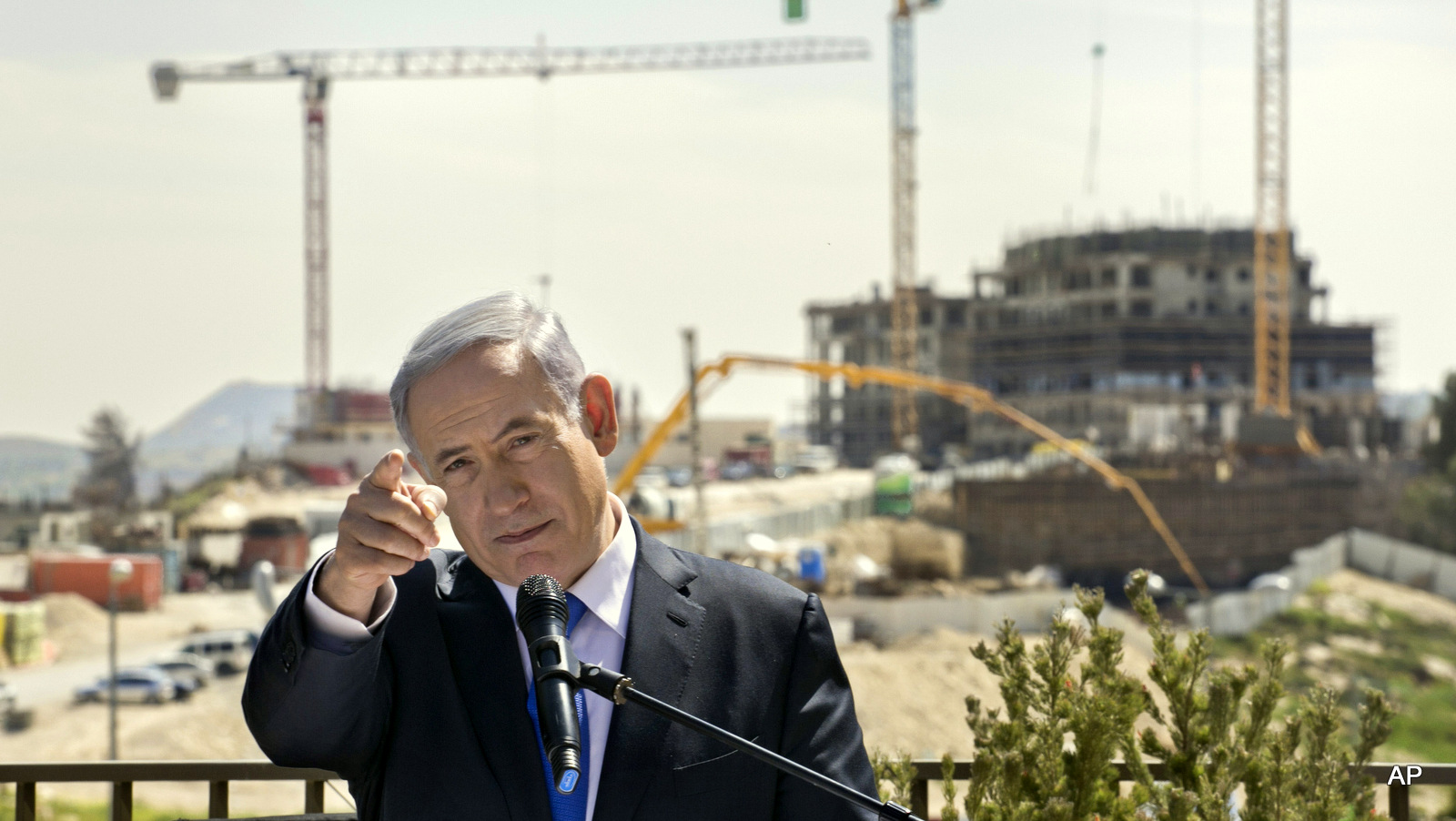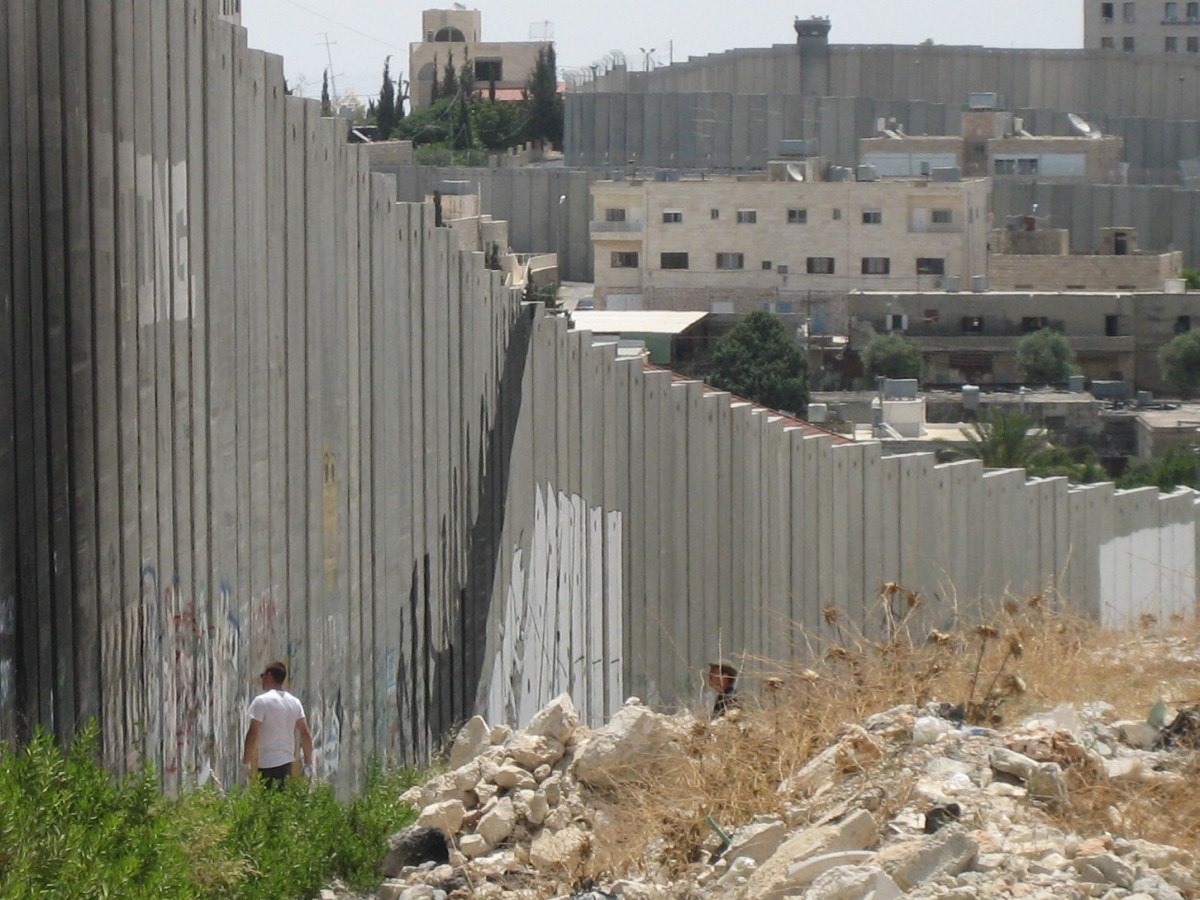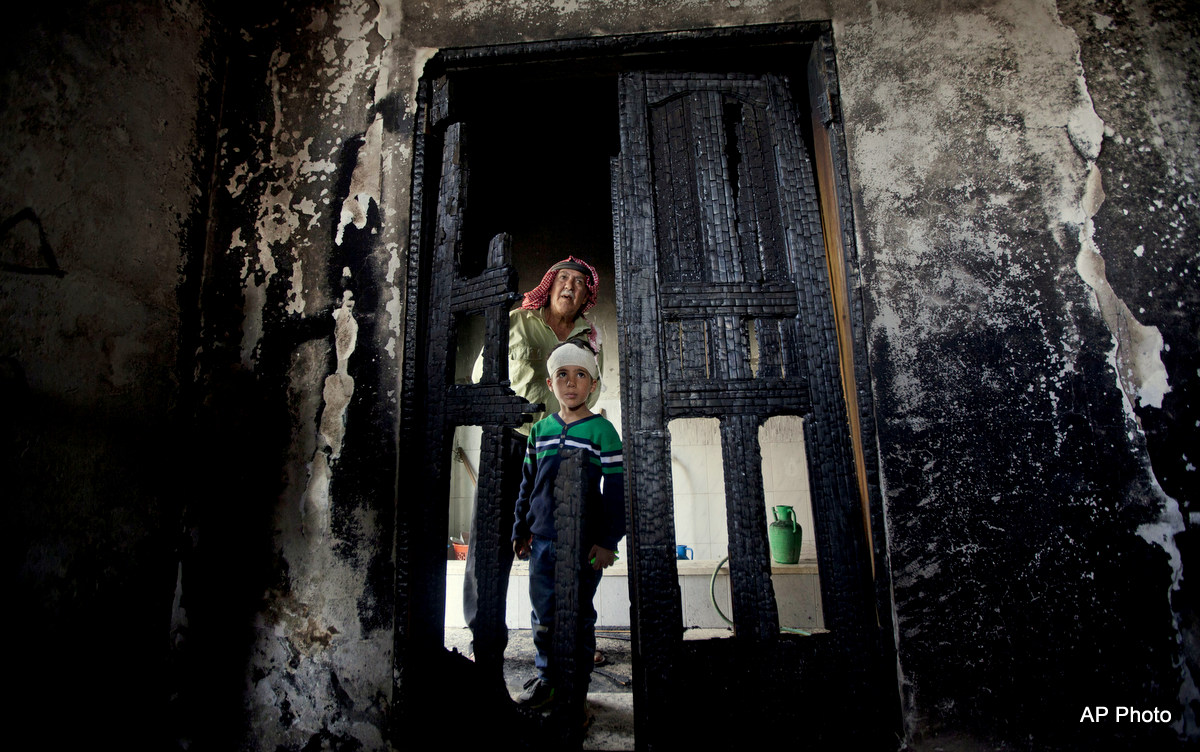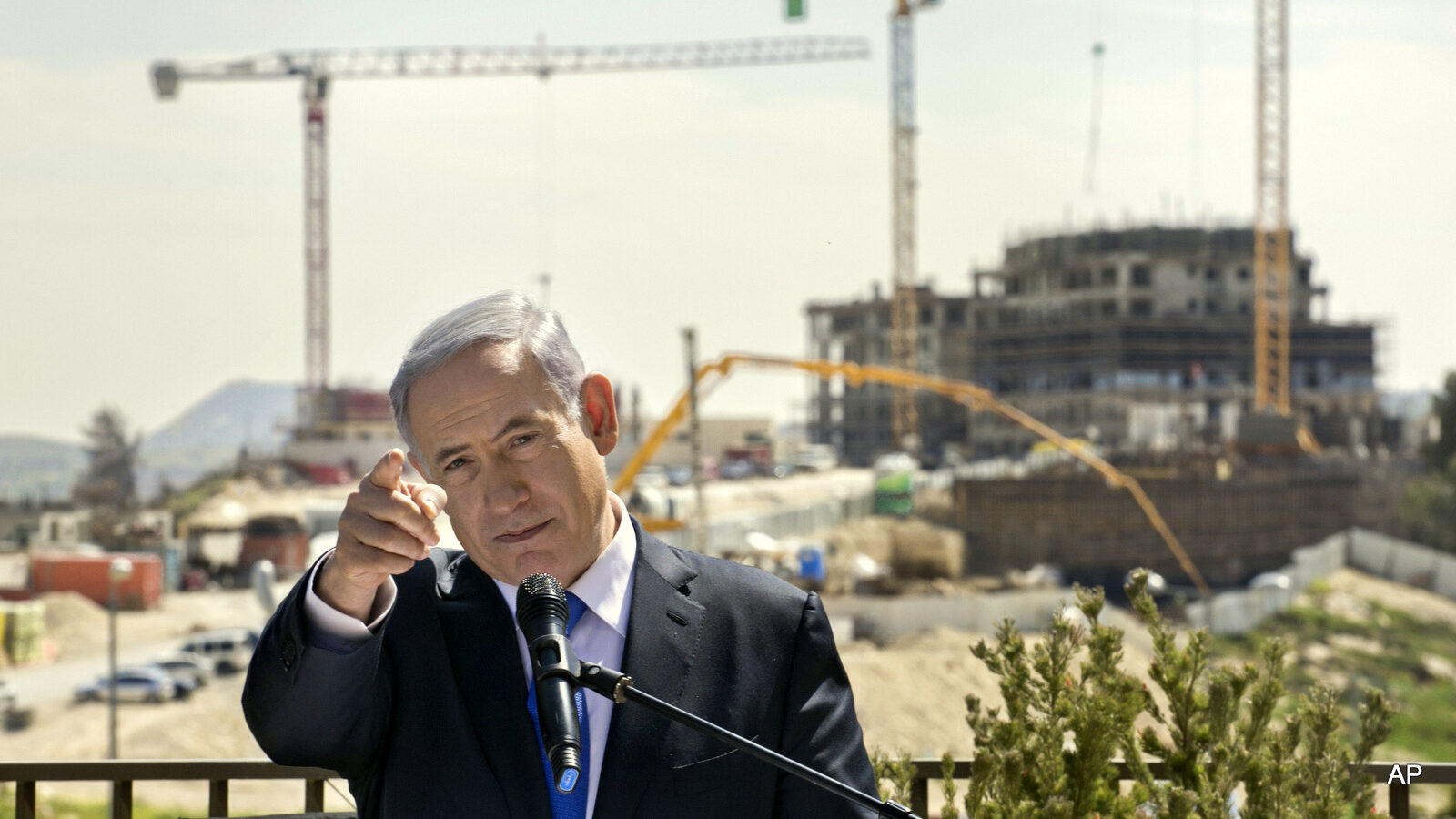 Israeli Prime Minister Benjamin Netanyahu talks as he visits a settlement site in Har Homa, east Jerusalem, Monday March 16, 2015, a day ahead of legislative elections. Netanyahu won his fourth term as prime minister.
Israeli Prime Minister Benjamin Netanyahu talks as he visits a settlement site in Har Homa, east Jerusalem, Monday March 16, 2015, a day ahead of legislative elections. Netanyahu won his fourth term as prime minister.
Benjamin Netanyahu’s victory in the latest round of Israeli elections raises a fundamental issue that very few here in the United States want to acknowledge: Israel has more or less officially abandoned the long-touted two-state solution for the resolution of the Israeli-Palestinian conflict. Of course, this has pretty much been the case on the ground in Israel and Palestine for years now, but Netanyahu’s last-ditch attempt to rouse his right-wing base to the polls by stating that there would be no Palestinian state so long as he was prime minister telegraphed loud and clear what has been merely winked and nodded at before.
That this message was also accompanied by vile race-baiting of a type that is usually seen only in the old-timey American conservative politics was also instructive. The left, he warned, was “bussing in” Israeli Arabs to vote “in droves,” emphasizing the threat that posed to his right-wing government. The implication was that Israeli Arabs and Israel’s non-Jewish citizens are somehow alien — a dangerous “other” that lives on the fringes of society — and they’re being organized by a leftist conspiracy to overthrow the rightful government of the State of Israel and its people. Netanyahu’s voters and supporters were the “Real Israelis,” whereas those others were not.
Like a specter, the threat of a non-Jewish population with citizenship and voting rights rising up to use the franchise as equals in a democratic country looked to be too much to bear, and as a consequence consolidated support on the right for the Likud Party and Netanyahu. This is remarkable because it shows the inherent contradictions of having a democratic Jewish state that nonetheless has a very large non-Jewish citizen population living within it. Indeed, such is the threat of non-Jewish citizens in Israel that Netanyahu put forward a bill last year to officially establish Israel as a Jewish nation-state and in effect to inscribe into constitutional writ existing legal inequalities between Jews and Arabs that date back to the days when Israel was a settler colony under the British Mandate.
Liberal vs. ethnic democracy
 The Israeli West Bank ‘separation wall’ , which surrounds much of the occupied territory, as it passes through Bethlehem Aida refugee camp. The wall and its security checkpoints are a very literal barrier to Palestininan economic growth. (Photo/The Advocacy Project via Flickr)
The Israeli West Bank ‘separation wall’ , which surrounds much of the occupied territory, as it passes through Bethlehem Aida refugee camp. The wall and its security checkpoints are a very literal barrier to Palestininan economic growth. (Photo/The Advocacy Project via Flickr)
Indeed, it was not until 1994 that Israel established something that might be called an official bill of individual rights that might apply to its non-Jewish citizens just as well as Jews. As Israeli political watcher and legal scholar Bernard Avishai noted, the 1994 law provided a legal route for non-Jews to challenge the old discriminatory legal structure that dominated the Israeli state and, what’s more, to do so successfully. Thus, what has been happening within Israel proper for some time now is a growing reaction against the essential Jewishness of Israel, which tends to discriminate against non-Jews and privileges more conservative interpretations of the faith over more liberal or secular views of both Israeli citizenship and Judaism.
Israel has been going through in miniature what the U.S. has been suffering for many decades now: a shift away from popular understanding of the country as being for one particular type of people to a broader, more inclusive definition that includes people outside the mainstream majority. Here in the U.S. this shift created a violent backlash and saw peaceful marches set upon by dogs and baton-wielding thugs as well as assassinations and terror bombings. Israel has seen much the same, and its culturally-conservative right wing, like our own here in the U.S., has fought tooth and nail to maintain its own status and privilege.
As Max Blumenthal documents so well in his book on the growth of the illiberal Israeli right, this means there is a “proudly racist” part of Israeli society that looks very much like what one would have found in the old Jim Crow South in the U.S. or Apartheid South Africa. They view Arabs and non-Jews living in Israel, even citizens, much in the same way the ethnic majorities in those two societies viewed their minorities — as unwanted untermensch that survive at the sufferance of the majority. What’s more, this growing illiberalism has spilled over into debates on the treatment of women, while its more radical elements call for stripping Israeli Arabs of their citizenship or even, as Israel’s current foreign minister opines, beheading Israeli Arabs who show disloyalty to the state.
Dhimmitude with Jewish characteristics
 An Israeli Jewish settler shoots in the air as Palestinians protest against the Prawer Plan to resettle Israel’s Palestinian Bedouin minority from their villages in the Negev Desert, near the Israeli settlement of Bet El, north of the West Bank city of Ramallah, Saturday, Nov. 30, 2013.
An Israeli Jewish settler shoots in the air as Palestinians protest against the Prawer Plan to resettle Israel’s Palestinian Bedouin minority from their villages in the Negev Desert, near the Israeli settlement of Bet El, north of the West Bank city of Ramallah, Saturday, Nov. 30, 2013.
If Israeli Arabs and other non-Jewish citizens want to know what the future looks like under an ascendant right wing, they have only to look to the Occupied Territories. There the full weight of the Jewish state is engaged 24 hours a day, seven days a week, in subjecting its non-Jewish, non-citizen residents to its will. What this means should be known to any person familiar with the situation, but for those who aren’t it means random dispossession and destruction of one’s property, indefinite detention of one’s person for no reason, being subject to state violence up to and including termination of one’s life, pervasive surveillance, systematic economic exploitation and disenfranchisement, restrictions on travel, and denial of even the most basic civil services.
That no one should want to live under such conditions is obvious, thus explaining the new vigor of Israeli Arabs at the polls and the extremes Netanyahu went to in order to head off defeat during the election. The prime minister may have been able to triumph this time, but the reality is that these issues will not be going away anytime soon. These issues cut to the core of the inherent problem with the Israeli project, or really any political project premised on privileging one group of people, for whatever reason, over another.
How can one create a state for one type of people when said state also contains sizable populations of others? If a state is established, will those others be citizens? Will they be equal under the law? How can they be, when every structure of both state and society is set up to benefit one group and not the other? What happens if those others demand equal rights or rebel against their circumstances?
Just because a country has elections and counts votes doesn’t make these things not a problem. Indeed, it takes more than just votes to make a modern democracy, and the old-style ethnic democracies that were the norm in the 20th century and which Israel exemplifies simply aren’t up to the task of dealing with a hyper-connected, multicultural and messy 21st century reality.
Israel, ourselves
 Palestinians inspect damages of a mosque following an attack in the West Bank village of Mughayer, north of Ramallah, Wednesday, Nov. 12, 2014. An attack against a mosque in a West Bank village early on Wednesday ignited a fire that destroyed its first floor, the village’s mayor said, blaming Jewish settlers for the attack.
Palestinians inspect damages of a mosque following an attack in the West Bank village of Mughayer, north of Ramallah, Wednesday, Nov. 12, 2014. An attack against a mosque in a West Bank village early on Wednesday ignited a fire that destroyed its first floor, the village’s mayor said, blaming Jewish settlers for the attack.
It has been said that Israel cannot be all at the same time a democratic state, majority Jewish and exist within all the land it presently occupies. It can be two out of the three, but not all three. What Netanyahu’s victory suggests is that perhaps it cannot even be both democratic and majority Jewish within its old borders, either. Israel and its supporters here in the U.S. have long managed to keep up the myth of democratic Israel by maintaining the fiction that the West Bank occupation was temporary until a durable peace with Israel’s Palestinian neighbors could be struck. This was acceptable because Israel, for whatever its faults, was deemed the only democracy in the region and a valuable Cold War ally that was a nuclear power to boot.
Yet Israel is not the country many here in the U.S., for both political and ideological reasons, earnestly wish it to be. Here in America, what we want to see is a plucky little liberal democracy bravely standing up for its persecuted people. But what we get is a right-wing bully that looks like any other right wing bully — bigoted, arrogant, aggressive, self-righteous, militant and ultimately very dangerous. The reality is that Israel’s democracy is truncated and does not extend to the millions of West Bank Palestinians who are ground each day under by Israel’s decades-long occupation, now apparently permanent. More frightening still is the country’s reactionary impulse, epitomized by the coalition Netanyahu led to victory, to deny citizenship and rights to non-Jews within Israel itself.
This impulse, if left to grow stronger, would turn Israel into just the sort of tyrannical entity Jews themselves lived under and fled throughout their history. It’s a deeply depressing irony not because of what it says about Jews, Israel or Israelis, but about what is says about human nature and politics, in general. If the people running a state founded as a refuge for those subject to some of the most terrible persecutions in history cannot resist their own form of persecuting nationalist fanaticism, what hope do the rest of us have to do the same?


